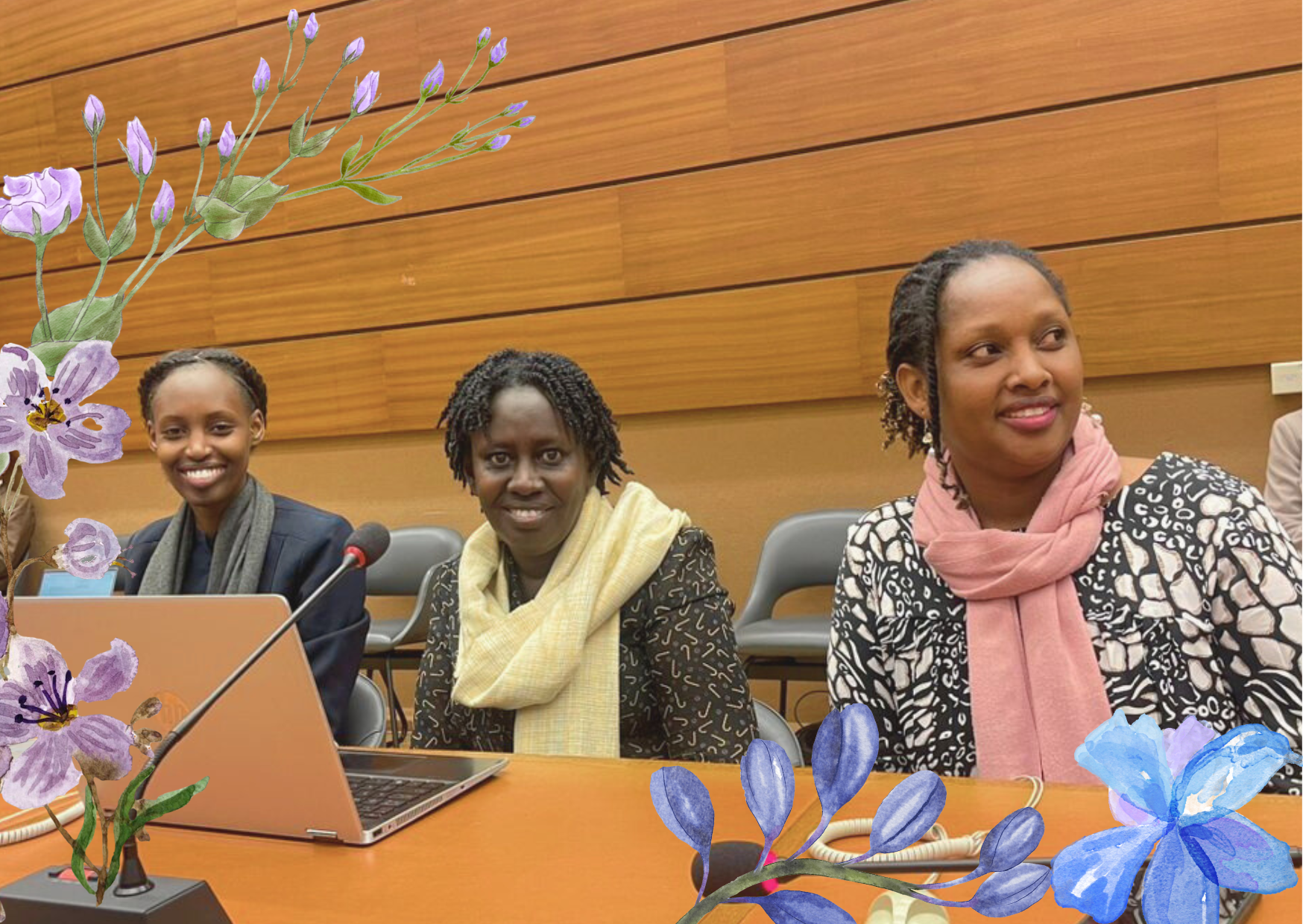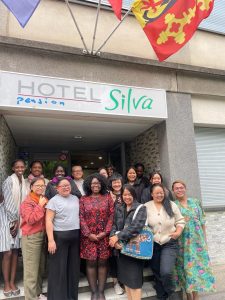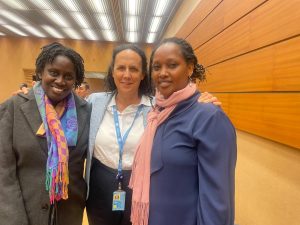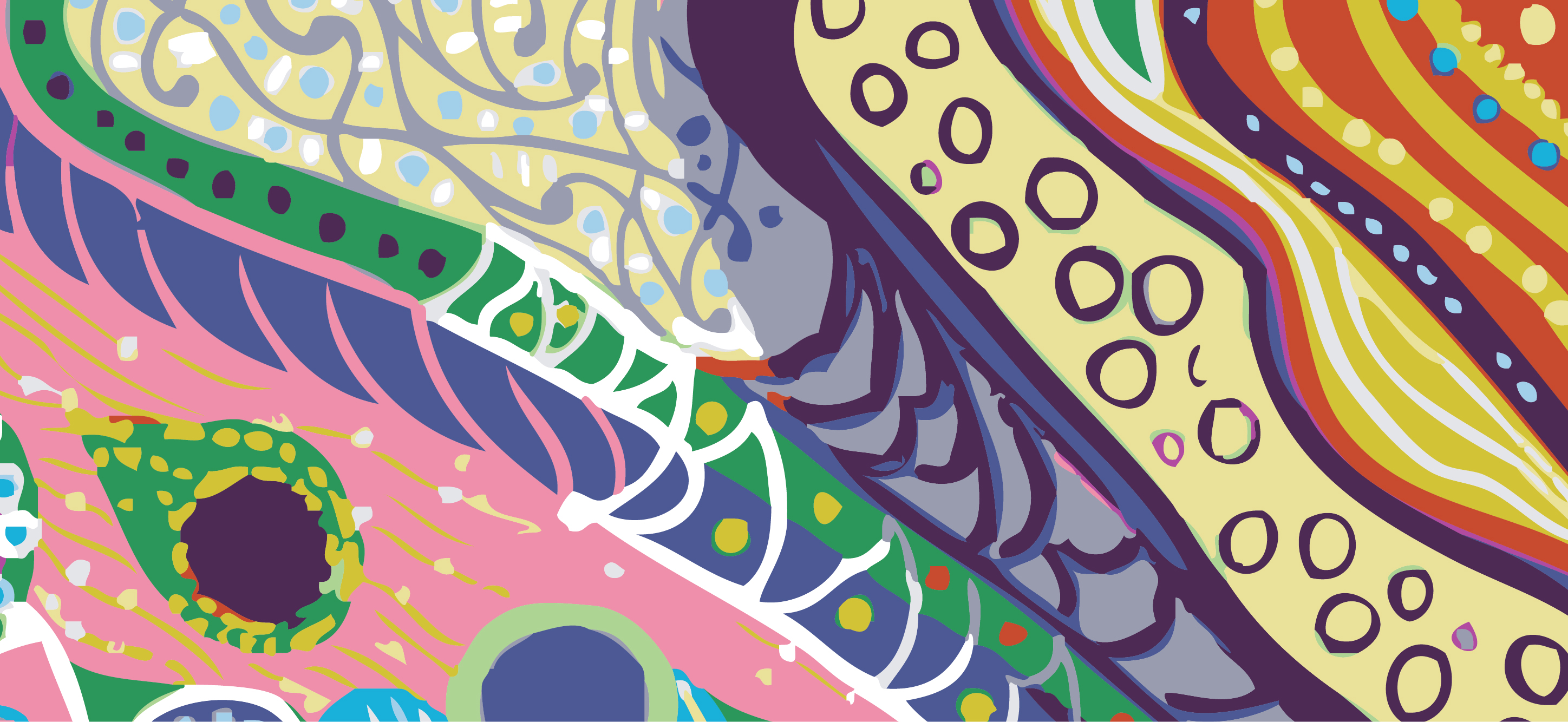
Left to Right: Patience Iribagiza (Executive Director, Afro Ark), Winnie Tumwine ( Executive Director, Hope for Single Mothers with Disabilities), and Dative Mukashema (Executive Director, Rwanda National Association of Deaf Women)
IWRAW Asia Pacific has been a consortium member of the Women Gaining Ground (WGG) project in partnership with CREA and Akili Dada since 2021. WGG is being implemented in collaboration with 16 in-country partners (in Bangladesh, India, Kenya, Rwanda, and Uganda), focusing on addressing gender-based violence (GBV) and increasing the leadership of young women and women with disabilities (WWDs).
WGG is starting a new monthly blog series, edited by Kavitha Devadas, WGG project lead, to share our collective learnings and reflections with the larger feminist and disability movement.
In the second installment of this series, Dative Mukashema, Executive Director of Rwanda National Association of Deaf Women, a feminist Deaf women organisation, recounts her experience of attending the 88th session of CEDAW and why women-led disability rights organisations need to participate in the CEDAW process.
Flying out of Rwanda for Geneva, it was not clear to me how we would proceed with pushing and influencing the Committee on the Elimination of All Forms of Discrimination Against Women (CEDAW Committee) to consider the issues we put forward in our shadow report. It was important for me, as a representative of a grassroots organisation, to not just share the facts but also the lived experiences of women with disabilities from the grassroots level and also bring to the attention of the Committee the intersectionality of gender, disability, and discrimination. As a member of the deaf community, I am directly related to both the group of beneficiaries and the problems of the group.
From Rwanda to Geneva: why did we make this journey?
CEDAW is one of the important human rights treaties among the international instruments that has provided an international legal framework to ensure the respect, protection, and fulfillment of the rights of all women and girls. However, for many years, women and girls with disabilities have been left outside of the women’s rights agenda in almost every country.
This is because small grassroots women-led organisations of persons with disabilities (OPD) such as ours—the Rwandan National Association of Deaf Women (RNADW)—often lack the resources to do their reporting and participate meaningfully in the CEDAW process, as funding and comprehensive support remain a challenge. In Rwanda, for years our organisation’s participation ended at the consultation stage to draft the parallel reporting in the larger disability movement which is dominated by men with disabilities. Even the women’s organisations that were reporting often did not include the perspectives of deaf women and hard of hearing/women with disabilities. Therefore, I was grateful for this opportunity for the RNADW to participate in person directly at the 88th CEDAW session. During the CEDAW review process, we fronted the issues of women with disabilities and became visible enough in the process. In the absence of groups like ours, it was common practice for state parties to ‘brush aside’ and ignore our issues.
We, along with the other partners in WGG, had undergone introductory training on CEDAW and attended the online NGO briefings organised by IWRAW Asia Pacific as part of the strategic work in the project. After the training, my organisation embarked on translating IWRAW AP’s existing videos on the core principles of CEDAW (substantive equality, non-discrimination, and state obligation) into Rwanda Sign Language because there were no such resources available for the deaf community.
However, putting together a shadow report still requires time and resources, to collect updated information, and to understand the mechanisms of the reporting system. What kinds of questions will the committee ask NGOs and the states? Do we get to watch our government’s responses? So many questions. Rwanda’s CEDAW review had been postponed for a year, which meant our information, analysis, and preparation to participate in the review also needed to consider the delay.

Global to Local participants with the IWRAW Asia Pacific team
Luckily enough, being selected for IWRAW AP’s Global to Local training brought clarity and confidence to me and my team around the process. Honestly, since it was my first time in Geneva and reporting on CEDAW, this is the kind of preparation I needed to boost my confidence to understand that I was doing the right thing and improve my language and approach to use in the process.
During this training, we had enough time to make mistakes and get guidance on how to coordinate the presentation and which issues to prioritise, both during the private lunch briefing and public informal meeting. Thinking through some practical considerations feels very different when sitting in the UN spaces in Geneva compared to being at home.
Reimagining access
I had imagined that the CEDAW reviews would have sign language interpretation, much in the same way that UNCRPD does. Both these treaty bodies’ reviews take place in the same building now, they have similar processes, but why is there such a marked difference in accessibility? Without the generous support of external funders such as the WGG consortium that allowed me to bring my sign language interpreters, access becomes a constant negotiation. It should also not be circumscribed by financial resources.
As much as we needed to be present at the session to hold our governments accountable, there is also something powerful about the outside world watching us, women and girls with disabilities, occupy such global spaces. Yet it calls for a reimagining of accessibility at the same time. For example, when you present as a deaf person, the camera focuses on the interpreters because that’s where the voice emanates from, but it is the deaf person presenting. In my case, on the day of the public informal meeting, my interpreters used the microphone in front of me when we were presenting our oral statements, so that the camera could capture me. However, this is not a long-term solution if several participants are at the table. The burden of negotiating access and finding solutions continues to fall on persons with disabilities. Only with accessible and inclusive services, including physical spaces, information, and a creative and nuanced understanding of accessibility, will the participation of persons with disabilities, in particular deaf women, be more meaningful.
The focus of our shadow report
Our shadow report focused in particular on CEDAW Article 7 on participation in political and public life. Rwanda has a strong women’s representation, with 61% of women sitting at the Chamber of Deputies, exceeding the minimum 30% rule. One seat among a total of 80 is reserved for persons with disabilities. Still, those provisions have never allowed any representation of women with disabilities; we found out that the reserved seat, elected by the National Council of Persons with Disabilities, has been permanently occupied by a man. Despite the strong representation of women, no elected woman identifies as a woman living with a disability. If we acknowledge that women with disabilities are eligible candidates from their specific political parties and other leadership positions, how have these gaps in political leadership continued to exist?
Rwanda has also put in place institutional arrangements including the gender machinery and grassroots structures, specifically the National Women’s Council (NWC). However, there remain systemic and structural barriers specifically for women with disabilities that need to be addressed. Women with disabilities remain largely underrepresented in public governance structures and private institutions due to socio-cultural norms, economic marginalisation, and limited access to inclusive education and employment which hinder their participation in decision-making processes, consequently affecting their well-being.
We also focused on healthcare and family planning (Article 12 of CEDAW). Women and girls with disabilities in all their diversity have the same sexual and reproductive health (SRH)-related needs and rights as those without disabilities. Studies have shown that they are sexually active and have the same concerns about sexuality, relationships, and identity as their peers. Yet, too often stigma and misconceptions about disability, along with a lack of accessible SRH information and services, limited personal autonomy, and a lack of empowerment, prevent women and girls with disabilities from leading healthy sexual lives and fully enjoying their rights. The assessment of accessibility and inclusiveness of services conducted in Nyamasheke and Rutsiro districts by the National Union of Disability Organisations (NUDOR), evidently showed the low level of inclusion of persons with disabilities in health services. Another research conducted by UNABU (Umuryango Nyarwanda w’Abagore Bafite Ubumuga), another organisation of women with disabilities in Rwanda, found that more than 40% of Rwandan women and girls with disabilities surveyed had experienced some form of violence, and yet could not access services for survivors at the government’s Isange One Stop Centres (IOSCs). This is despite strong legislation and such institutional facilities being operational countrywide, providing free and comprehensive services to victims of gender-based violence (GBV) and child abuse.
Based on this situation at the ground level, some of our key recommendations to the Committee were to ask the state party to:
- Reform Constitutional Article 75 to allow for two (male and female) representations from the National Council of Persons with Disabilities in Parliament. In addition, ensure that the 30% women quota has at least 10% representation of women with disabilities at all levels and in all national structures of women, including in gender machinery, in public office, and at a senior level of private institutions.
- Establish and ensure free access to disability-inclusive and disability-specific schools at all levels, and ensure inclusive access to social protection services, including direct support, that enable women and girls with disabilities to have equal access to education.
- Put in place a law that ensures consent, including third-party consent, chosen by the service seeker, for women and girls with disabilities to decide on contraceptive methods of their choice.
- Ensure representation of women with disabilities among community health workers at community levels and meet disability workers’ needs to ensure their meaningful representation and participation.
- Recognise Rwandan Sign Language as an official language; expedite the sign language dictionary; fund training, standardisation, and certification for sign language interpreters; and ensure that services are available to the deaf.
- Ensure that sexual and reproductive health (SRHR) services for women with disabilities are accessible, available, and affordable.

Left to Right: Winnie Tumwine ( Executive Director of Hope for Single Mothers with Disabilities), Mrs. Ana Peláez Nerváez (Chair, CEDAW Committee), Dative Mukashema (Executive Director, Rwanda National Association of Deaf Women)
During our interactions in Geneva, we learned of the struggles of the CEDAW working group on SRHR. They have been seeking permission from the state parties to visit the countries and learn about the realities on the ground but have never received any approval or invitation. Within the UN system, UN Women is mandated to lead, promote, and coordinate efforts to advance the full realisation of women’s rights and opportunities. The UN General Assembly called on all parts of the UN system to promote gender equality and the empowerment of women within their mandates and ensure that commitments on paper lead to progress on the ground. As local, small disability organisations in Rwanda are struggling with resources and connections, I would suggest the UN Women’s Office in its mandate finance, support and coordinate the efforts of NGOs to participate in the reviews in their respective countries.
Going forward, RNADW’s advocacy work would entail monitoring how the recommendations are being implemented while also engaging with our government on how to work together to implement the Concluding Observations (recommendations set forth by the CEDAW Committee after the end of the review). Deaf women organisations in particular will work on certain areas to complement the government’s efforts in promoting our rights.
About the author
Dative Mukashema is a Rwandan returnee refugee, profoundly deaf. In her professional capacity, she is a feminist and a disability rights activist with over ten years of experience, a deputy legal representative, and executive director of Rwanda National Association of Deaf Women, a feminist Deaf women organisation. She spent her early years working as a special needs educational facilitator for learners who are deaf refugees in a Rwanda refugee camp. She considers herself astute, focused, and determined to tackle the challenges facing deaf women and girls in their diversity.

